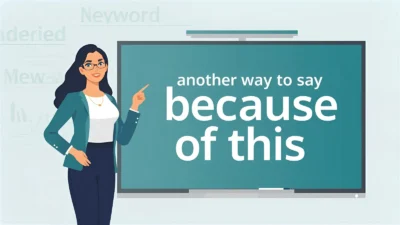The word “great” is one of the most overused positive adjectives in English. It can describe everything from a “great idea” to a “great day,” but its frequent use can make your writing or speech feel repetitive or less expressive.
Fortunately, English offers a wide variety of alternatives — each with a slightly different shade of meaning, level of formality, and emotional tone. Choosing the right word helps you sound more precise, professional, and engaging.
In this guide, you’ll find 48 effective alternatives to “great”, complete with definitions, explanations, examples, and tone notes to help you choose the perfect fit for any situation.
1. Excellent
Meaning: Extremely good or outstanding in quality.
Detailed Explanation: A polished and formal alternative, often used in academic or business settings.
Scenario Example: You did an excellent job on the presentation.
Best Use: Professional writing, feedback, reports.
Tone: Formal, respectful, confident.
2. Outstanding
Meaning: Exceptionally impressive or superior to others.
Detailed Explanation: Suggests something or someone stands above the rest.
Scenario Example: Her leadership during the project was outstanding.
Best Use: Performance reviews, awards, formal praise.
Tone: Admirable, professional, high-impact.
3. Fantastic
Meaning: Very good, impressive, or enjoyable.
Detailed Explanation: Slightly informal but highly positive. Adds enthusiasm and friendliness.
Scenario Example: That’s a fantastic idea for our next campaign!
Best Use: Conversations, casual writing, upbeat contexts.
Tone: Energetic, cheerful, informal.
4. Wonderful
Meaning: Inspiring delight, pleasure, or admiration.
Detailed Explanation: Often conveys warmth and emotional positivity.
Scenario Example: It was wonderful seeing you again after so long.
Best Use: Emails, social messages, heartfelt communication.
Tone: Warm, friendly, genuine.
5. Impressive
Meaning: Evoking admiration due to skill or quality.
Detailed Explanation: Highlights capability or achievement.
Scenario Example: Your attention to detail is truly impressive.
Best Use: Performance feedback, presentations, reviews.
Tone: Respectful, formal, appreciative.
6. Amazing
Meaning: Causing great surprise or wonder; excellent.
Detailed Explanation: A versatile term suitable for both casual and emotional contexts.
Scenario Example: That movie was amazing — I didn’t expect the ending!
Best Use: Casual speech, storytelling, social posts.
Tone: Excited, expressive, informal.
7. Incredible
Meaning: Hard to believe due to excellence or extraordinariness.
Detailed Explanation: Adds intensity and admiration.
Scenario Example: You’ve made incredible progress this quarter.
Best Use: Speeches, praise, storytelling.
Tone: Enthusiastic, strong, impactful.
8. Superb
Meaning: Of the highest quality or excellence.
Detailed Explanation: More refined and formal than “great.”
Scenario Example: The event was superbly organized and executed.
Best Use: Business, formal events, reviews.
Tone: Elegant, sophisticated, formal.
9. Terrific
Meaning: Extremely good or excellent.
Detailed Explanation: Slightly casual but enthusiastic and affirming.
Scenario Example: That’s a terrific solution — let’s implement it.
Best Use: Informal speech, work encouragement.
Tone: Upbeat, supportive, positive.
10. Exceptional
Meaning: Unusually good or outstanding.
Detailed Explanation: Implies rare quality or superior performance.
Scenario Example: She’s an exceptional teacher with remarkable patience.
Best Use: Professional reviews, academic praise.
Tone: Formal, admiring, serious.
11. Remarkable
Meaning: Worthy of attention; extraordinary.
Detailed Explanation: Ideal for emphasizing uniqueness or excellence.
Scenario Example: Your progress in just two months is remarkable.
Best Use: Business, motivational writing, personal recognition.
Tone: Thoughtful, impressed.
12. Awesome
Meaning: Extremely good; inspiring awe or admiration.
Detailed Explanation: Common in casual or youth-oriented speech.
Scenario Example: That concert was awesome — best night ever!
Best Use: Informal speech, friendly contexts.
Tone: Casual, expressive, modern.
13. Magnificent
Meaning: Splendid or grand in appearance or performance.
Detailed Explanation: Adds drama or grandeur to your compliment.
Scenario Example: The view from the top was absolutely magnificent.
Best Use: Descriptive writing, storytelling.
Tone: Poetic, dramatic, formal.
14. Fabulous
Meaning: Extremely good or wonderful.
Detailed Explanation: Adds energy and delight to praise.
Scenario Example: You look fabulous tonight!
Best Use: Social conversation, lifestyle writing.
Tone: Stylish, lively, expressive.
15. Splendid
Meaning: Brilliant, excellent, or grand.
Detailed Explanation: Old-fashioned yet elegant; ideal for formal charm.
Scenario Example: You’ve done a splendid job organizing everything.
Best Use: Formal writing, speeches, or polite praise.
Tone: Refined, formal, complimentary.
16. Impeccable
Meaning: Flawless or perfect in every way.
Detailed Explanation: Best used for precision, performance, or style.
Scenario Example: His manners were impeccable throughout the dinner.
Best Use: Reviews, professional assessments.
Tone: Sophisticated, respectful, formal.
17. Marvelous
Meaning: Causing wonder; extraordinarily good.
Detailed Explanation: Combines elegance with enthusiasm.
Scenario Example: It was a marvelous weekend getaway.
Best Use: Storytelling, polite conversation.
Tone: Warm, formal, charming.
18. Phenomenal
Meaning: Very remarkable; extraordinary.
Detailed Explanation: Suggests exceptional success or performance.
Scenario Example: The team achieved phenomenal results this quarter.
Best Use: Business, marketing, or motivational writing.
Tone: Powerful, inspiring, formal.
19. Brilliant
Meaning: Exceptionally clever or impressive.
Detailed Explanation: Common in British English for excellence or intelligence.
Scenario Example: That was a brilliant solution to a tricky problem.
Best Use: Academic, workplace, or casual British tone.
Tone: Intelligent, enthusiastic, refined.
20. Tremendous
Meaning: Very great in amount, scale, or excellence.
Detailed Explanation: Emphasizes magnitude and enthusiasm.
Scenario Example: We’ve seen tremendous growth this year.
Best Use: Business presentations, public speaking.
Tone: Dynamic, motivational, strong.
21. Immaculate
Meaning: Perfectly clean, neat, or flawless.
Detailed Explanation: Often used for design, performance, or precision.
Scenario Example: The room was in immaculate condition.
Best Use: Formal descriptions, reviews.
Tone: Elegant, precise, formal.
22. Top-Notch
Meaning: Of the highest quality; first-rate.
Detailed Explanation: Informal yet polished; ideal for compliments.
Scenario Example: Your presentation skills are top-notch.
Best Use: Workplace praise, friendly business tone.
Tone: Professional, upbeat, informal.
23. First-Class
Meaning: Of the very best standard or quality.
Detailed Explanation: Evokes professionalism and excellence.
Scenario Example: They provided first-class customer service.
Best Use: Business writing, professional reviews.
Tone: Polished, corporate, formal.
24. Admirable
Meaning: Deserving respect or approval.
Detailed Explanation: Focuses on effort, character, or integrity.
Scenario Example: Your dedication to the team is truly admirable.
Best Use: Formal praise, character assessments.
Tone: Respectful, sincere, composed.
25. Excellent Work (Phrase Alternative)
Meaning: Praises performance directly.
Detailed Explanation: Simple yet powerful; fits nearly all professional settings.
Scenario Example: Excellent work on completing the report ahead of schedule.
Best Use: Workplace feedback, professional praise.
Tone: Encouraging, professional, positive.
Conclusion
While “great” is perfectly fine for everyday use, rotating between words like “outstanding,” “exceptional,” “impressive,” or “phenomenal” adds depth and personality to your communication. Whether you’re writing an email, giving feedback, or chatting with a friend, these alternatives help you sound more polished, expressive, and precise.
A richer vocabulary doesn’t just make you sound smarter — it makes your appreciation feel more genuine.



